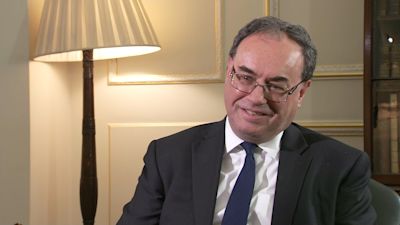1.3 million jobs saved as Bank of England cuts unemployment forecast

ITV News Economics Editor Joel Hills breaks down the figures of a better than expected recovery
Things are looking up.
Spending was always going to bounce back quickly when restrictions lifted but the vitality of the recovery has surprised even the Bank of England.
The vaccination program continues apace, Covid-19 lockdown measure are slowly being withdrawn and economic activity is rebounding strongly.
The latest survey data suggests that more than eight in 10 businesses are trading again.
Hairdressers can’t cut fast enough, credit and debit card spending is back to almost 'normal' levels and the housing market is on fire.
What’s behind the more positive outlook on employment? Bank of England Governor Andrew Bailey explains:
The outlook is brighter and the Bank now thinks the economy will recover to its pre-crisis size by the end of this year. Most strikingly, it has revised down its forecast for unemployment.
It expects the rate to peak this autumn at 5.5%. Three months ago, the Bank was predicting it would reach 7.75%. This time last year it thought up to 9.5% of adults could find themselves out of work. In the space of 12 months 1.3 million jobs have been salvaged.
This is a dramatic and extraordinarily welcome reassessment of our prospects.
Covid spending pushes deficit to highest levels since Second World War
Homeworkers do more unpaid overtime but less likely to get promoted, analysis shows
The Bank assumes that the government’s coronavirus roadmap will play out as planned - that restrictions will lift entirely by the end of June and that household spending and business investment will shift up through the gears.
But the main reason that the Bank believes that fears of mass unemployment will prove misplaced is that government support for household and businesses was extended significantly in the Budget.
When the Job Retention Scheme finally disappears at the end of September, the Bank thinks the level of economic activity will have recovered sufficiently to sustain jobs. The scheme current support 2.75 million employees.
“The majority of employees on furlough will return to work,” predicts Andrew Bailey, the Bank's governor. If the Bank is right, those who don’t will have plenty of vacancies to choose between.
‘It would have been unbearable’: Andrew Bailey says the economic landscape would have been ‘intolerable’ without ‘aggressive policies’ like the furlough scheme
The Bank believes that the worst collapse in GDP since 1709 will be followed by the strongest recovery since 1941. It calculates that the recession that lockdown triggered will prove less severe and much less scarring that the one we experienced during the financial crisis in 2008.
But Bailey is careful to insist that this a bounce back, not a boom. Government borrowing has soared to unsuitable levels, the task of closing the deficit will likely weigh on growth next year and beyond.
It’s worth remembering that revival in activity so far has not been even. Commuters are returning to trains and buses fairly slowly. Cities are recovering at different speeds. According to the ONS, the number of seated dinner reservations in Manchester on the first Saturday of May this year was 90% of its 2019 level. In London, it was only 43%.
The Bank thinks that long-term scarring from coronavirus will be limited but it’s too soon to judge, some behaviour may have changed for good during lockdown.
Internet search engine data offers fascinating insight into how household and businesses are behaving.
Analysis on Google trends, by Sam Tombs of Pantheon Macro, show what activity is coming back and what isn’t.
Searches for “shop” and “gym” are only a little above their pre-Covid level, meanwhile searches for “pub” and “hairdresser” are extremely high. Restaurants, which in England can only open for outdoor service, struggle on.
Cars sales are on the up but searches for the five most popular cars in the UK are running at about 15% below pre-Covid levels. “There’s no sign that consumers are splurging their recently accumulated savings on a new motor,” says Tombs.
Accumulated savings are being spent on property. The housing market is red-hot. Searches for property websites are running approximately 30% above pre-Covid norms. Lockdown has fuelled the desire for a change of scenery, the chancellor’s Stamp Duty cut has thrown oil on the fire.
The UK has just experienced the greatest collapse in economic output for more than a century but house prices continue to head north at speed.
And it is perhaps telling that searches for the word “redundancy” are pretty rare. “They spiked in July 2020 and correctly forewarned of a peak in layoffs a couple of months later,” says Tombs.
“They will give an early read on whether jobs are being lost this autumn when the furlough scheme is wound up.”
Listen to our coronavirus podcast: